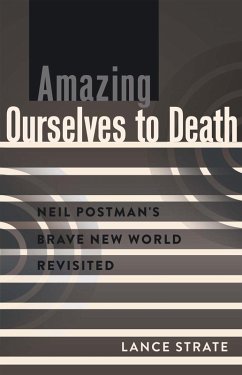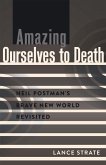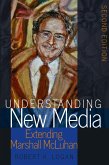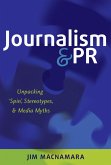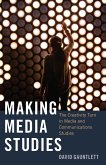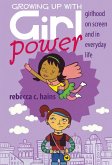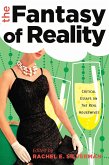Neil Postman's most popular work, Amusing Ourselves to Death (1985), provided an insightful critique of the effects of television on public discourse in America, arguing that television's bias towards entertaining content trivializes serious issues and undermines the basis of democratic culture. Lance Strate, who earned his doctorate under Neil Postman and is one of the leading media ecology scholars of our time, re-examines Postman's arguments, updating his analysis and critique for the twenty-first-century media environment that includes the expansion of television programming via cable and satellite as well as the Internet, the web, social media, and mobile technologies.
Integrating Postman's arguments about television with his critique of technology in general, Strate considers the current state of journalism, politics, religion, and education in American culture. Strate also contextualizes Amusing Ourselves to Death through an examination of Postman's life and career and the field of media ecology that Postman introduced. This is a book about our prospects for the future, which can only be based on the ways in which we think and talk about the present.
Integrating Postman's arguments about television with his critique of technology in general, Strate considers the current state of journalism, politics, religion, and education in American culture. Strate also contextualizes Amusing Ourselves to Death through an examination of Postman's life and career and the field of media ecology that Postman introduced. This is a book about our prospects for the future, which can only be based on the ways in which we think and talk about the present.
Dieser Download kann aus rechtlichen Gründen nur mit Rechnungsadresse in A, D ausgeliefert werden.
«When Neil Postman's Amusing Ourselves to Death is brought into the classroom, or given as a gift, or handed from one reader to another, a problem is created: into what frame should we place this book? For that's how unique it is. Lance Strate has solved that problem by writing a graceful and learned companion to Postman's original. It doubles as a biographical sketch of a great man and his intellectual times. It is also an act of love. And if you love the book it's about, you will be grateful for Strate's Amazing Ourselves to Death. I am. And I highly recommend it.» (Jay Rosen, Professor of Journalism, New York University)
«Lance Strate masterfully brings to a new generation, and a new century, Neil Postman's enligh-tening and essential insights into the ways that our uses of media reflect and reshape our society. He further shows how we can reclaim control, so we can use the ever-evolving media rather than letting them use us.» (Deborah Tannen, University Professor and Professor of Linguistics, Georgetown University)
«This book, I believe, will remain a foundational text in the field of educational technology. The content presented by the author is based on validated teaching and learning theories and reliable pedagogical principles. For those who are not familiar with Postman's body of work and that of his contemporaries, this homage is a useful compendium and foundation from which to examine emerging technologies and their impacts on culture and education.» (Diane Gayeski, Educational Technology, January/February 2015)
«Lance Strate masterfully brings to a new generation, and a new century, Neil Postman's enligh-tening and essential insights into the ways that our uses of media reflect and reshape our society. He further shows how we can reclaim control, so we can use the ever-evolving media rather than letting them use us.» (Deborah Tannen, University Professor and Professor of Linguistics, Georgetown University)
«This book, I believe, will remain a foundational text in the field of educational technology. The content presented by the author is based on validated teaching and learning theories and reliable pedagogical principles. For those who are not familiar with Postman's body of work and that of his contemporaries, this homage is a useful compendium and foundation from which to examine emerging technologies and their impacts on culture and education.» (Diane Gayeski, Educational Technology, January/February 2015)

